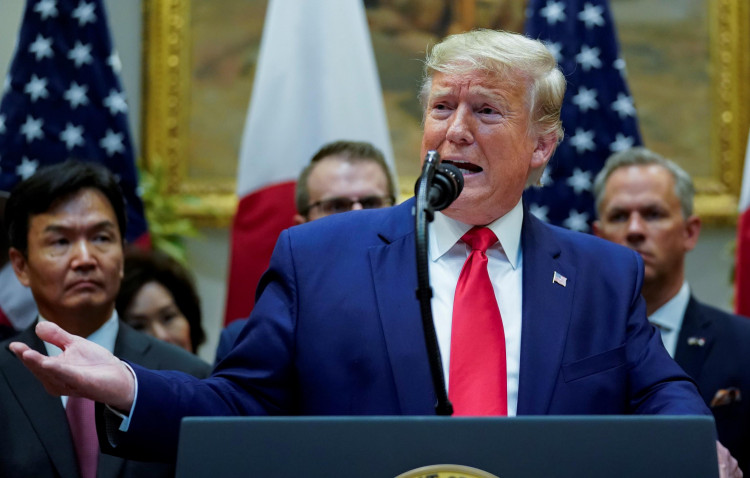House Democrats on Monday released the first transcripts from their closed-door interviews with Trump administration officials with knowledge of the festering Ukraine quid-pro-quo scandal certain to lead to the House's impeachment of President Donald Trump, perhaps as soon as this year.
Republicans, who once loudly demanded Democrats release these same transcripts, now condemn as "selectively leaking" the public revelations of testimonies by former U.S. ambassador to Ukraine Marie Yovanovitch and Michael McKinley, former senior adviser to Secretary of State Mike Pompeo, who resigned his post because of the Ukraine scandal.
The interview transcripts were released by Rep. Adam Schiff (D-CA) of the House Intelligence Committee, Rep. Eliot Engel (D-NY) of the Foreign Affairs Committee and Rep. Carolyn Maloney (D-NY) of the Oversight and Reform Committee.
The three Democrats said as their committees "move towards this new public phase of the impeachment inquiry, the American public will begin to see for themselves the evidence that the committees have collected. With each new interview, we learn more about the President's attempt to manipulate the levers of power to his political benefit."
Schiff announced Democrats will release more transcripts, such as those from U.S. ambassador to the European Union Gordon Sondland and former U.S. envoy to Ukraine Kurt Volker, within the week.
The transcripts of Yovanocitch's and McKinley's testimonies are hundreds of pages long and include full questions and answers. Some classified items have been redacted, however.
Yovanovitch revealed a campaign by Trump and his lawyer, Rudy Giuliani, to oust her from her post as ambassador. She also said she could have kept her job had she tweeted comments praising Trump -- which she refused to do.
"You need to, you know, tweet out there that you support the president and that all these are lies and everything else," said Yovanovitch. She said this is what Sondland told her to do. Sondland contributed large sums to Trump's presidential campaign and was appointed to his current diplomatic post as a reward.
"And, you know, so, you know, I mean, obviously, that was advice. It was advice that I did not see how I could implement in my role as an ambassador and as a Foreign Service officer," according to Yovanovitch.
Yovanovitch also said she learned from Ukrainian officials in November or December 2018 that Giuliani was talking to Ukraine's former top prosecutor, Yuri Lutsenko, "and that they had plans, and that they were going to, you know, do things, including to me."
Lutsenko was fired from his position by the Ukrainian government for not doing enough to fight corruption. His ouster was supported by the administration of former U.S. president Barack Obama and the European Union.
"It was people in the Ukrainian Government who said that Mr. Lutsenko, the former prosecutor general, was in communication with Mayor Giuliani," she said.
She also said Ukrainian officials told her she should "watch her back," because Giuliani associates Lev Parnas and Igor Fruman (both of whom were arrested in the U.S.) wanted her fired.
"I guess for -- because they wanted to have business dealings in Ukraine or additional business dealings," said Yovanovitch to House Intelligence Committee members, which included Republicans. "I didn't understand that, because nobody at the embassy had ever met those two individuals. And, you know, one of the biggest jobs of an American ambassador of the U.S. Embassy is to promote U.S. business. So, of course, if legitimate business comes to us, you know, that's what we do -- we promote U.S. business."
In his deposition, McKinley said the way Yovanovitch was treated "raised alarm bells" and that it "had a very serious effect on morale" on career Foreign Service professionals in the State Department.
"I'm just going to state it clearly. As a Foreign Service officer, to see the impugning of somebody I know to be a serious, committed colleague in the manner that it was done raised alarm bells for me."
McKinley also exposed the "backchannel" efforts by Giuliani, which he said included "a vicious smear campaign" to remove Yovanovitch.
He also pointed to the "bullying tactics" at the State Department after complaints were filed about getting information to Congress promptly. He revealed he was "absolutely appalled" the State Department and Mike Pompeo weren't going to provide legal financial assistance for department officials testifying before Congress.
McKinley said one of the reasons he resigned was because he saw the State Department trying to dig up dirt on former vice president Joe Biden, who will likely be Trump's opponent in the 2020 presidential election. He pointed out this is something he hadn't seen "in 37 years in the Foreign Service."
"To see the emerging information on the engagement of our missions to procure negative political information for domestic purposes, combined with the failure I saw in the building to provide support for our professional cadre in a particularly trying time, I think the combination was a pretty good reason to decide ... I had no longer a useful role to play," McKinley noted.
House Republicans blasted the release of Yovanovitch's and McKinley's testimonies, referring to them as leaks.
"The selective leaking in which the House Intelligence Committee has been engaged must end immediately and the complete record must be provided for the American people to see," wrote Rep. Liz Cheney (R-WY), a member of the House GOP leadership, in a letter to House Speaker Nancy Pelosi (D-NY).






